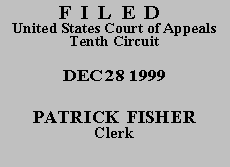

| PRISCILLA DEHERRERA,
Plaintiff-Appellant, v. KENNETH S. APFEL, Commissioner, Social Security Administration, Defendant-Appellee. |
|
Claimant Priscilla DeHerrera appeals from the district court's order affirming the decision of the Commissioner of Social Security denying her application for disability insurance benefits under Title II of the Social Security Act. Agency regulations establish a five-step sequential analysis to evaluate disability claims. See Williams v. Bowen, 844 F.2d 748, 750-52 (10th Cir. 1988) (describing five steps in detail). Here, the administrative law judge (ALJ) reached step five of the analysis, determining that claimant could perform jobs which exist in significant numbers in the national economy.
Claimant filed suit in district court; the court affirmed the agency's denial of benefits. Our jurisdiction over this appeal arises under 28 U.S.C. § 1291. Our review of the agency's decision is limited to determining whether the decision is supported by substantial evidence in the record as a whole and whether the correct legal standards were applied. See Castellano v. Secretary of Health & Human Servs., 26 F.3d 1027, 1028 (10th Cir. 1994). On appeal, claimant contends that the ALJ erred in 1) relying on the hearing testimony of a vocational expert (VE) based on an allegedly improper hypothetical; 2) finding that claimant had no nonexertional impairments; 3) rejecting opinions from claimant's treating physicians that she was disabled; and 4) discounting claimant's credibility.
As part of her argument challenging the ALJ's hypothetical to the VE, claimant contends that because she was fifty years of age at the hearing before the ALJ, she should have been considered a person "closely approaching advanced age." See Appellant's Br. at 20-21. Agency regulations state that any claimant under age 50 is a "younger person." See 20 C.F.R. § 404.1563(b). The next category, "approaching advanced age," covers persons from age 50 to 54. See id. § 404.1563(c). Claimants age 55 or older are in the "advanced age" category. See id. § 404.1563(d). Although the ALJ's decision correctly notes that claimant is a person "approaching advanced age," see Appellant's App., Vol. I at 21, the hypothetical the ALJ posed to the VE at the hearing included an age range of 45 to 50 years, see id. at 238. Claimant contends that the hypothetical misstated her age and therefore precluded the ALJ from considering whether she was disabled in light of her inability to perform a full range of light work and a lack of transferable skills. See Appellant's Br. at 21. However, the agency's regulations do not support claimant's argument. They provide that "advanced age" claimants who are unable to perform medium work "may not be able to work unless [they] have skills that can be used in (transferred to) less demanding jobs . . . ." Id. However, as to persons "approaching advanced age," such as claimant, the regulations state only that the agency "will consider that [their] age, along with a severe impairment and limited work experience, may seriously affect [their] ability to adjust to a significant number of jobs in the national economy." Id. § 404.1563(c). Claimant does not contend that her age, recognized impairments, and work experience present adjustment problems or challenge the ALJ's decision or analysis on that basis. We conclude this argument lacks merit.
After careful review of the record on appeal and consideration of claimant's remaining arguments in light of the applicable legal standards, we conclude that substantial evidence supports the agency's decision and that the ALJ applied the correct legal standards. Further, we conclude the district court correctly decided this case. Therefore, for substantially the same reasons set forth herein and in the district court's thorough order, dated February 26, 1999, the judgment of the United States District Court for the District of Colorado is AFFIRMED.
Entered for the Court
Circuit Judge
*. This order and judgment is not binding precedent, except under the doctrines of law of the case, res judicata, and collateral estoppel. The court generally disfavors the citation of orders and judgments; nevertheless, an order and judgment may be cited under the terms and conditions of 10th Cir. R. 36.3.